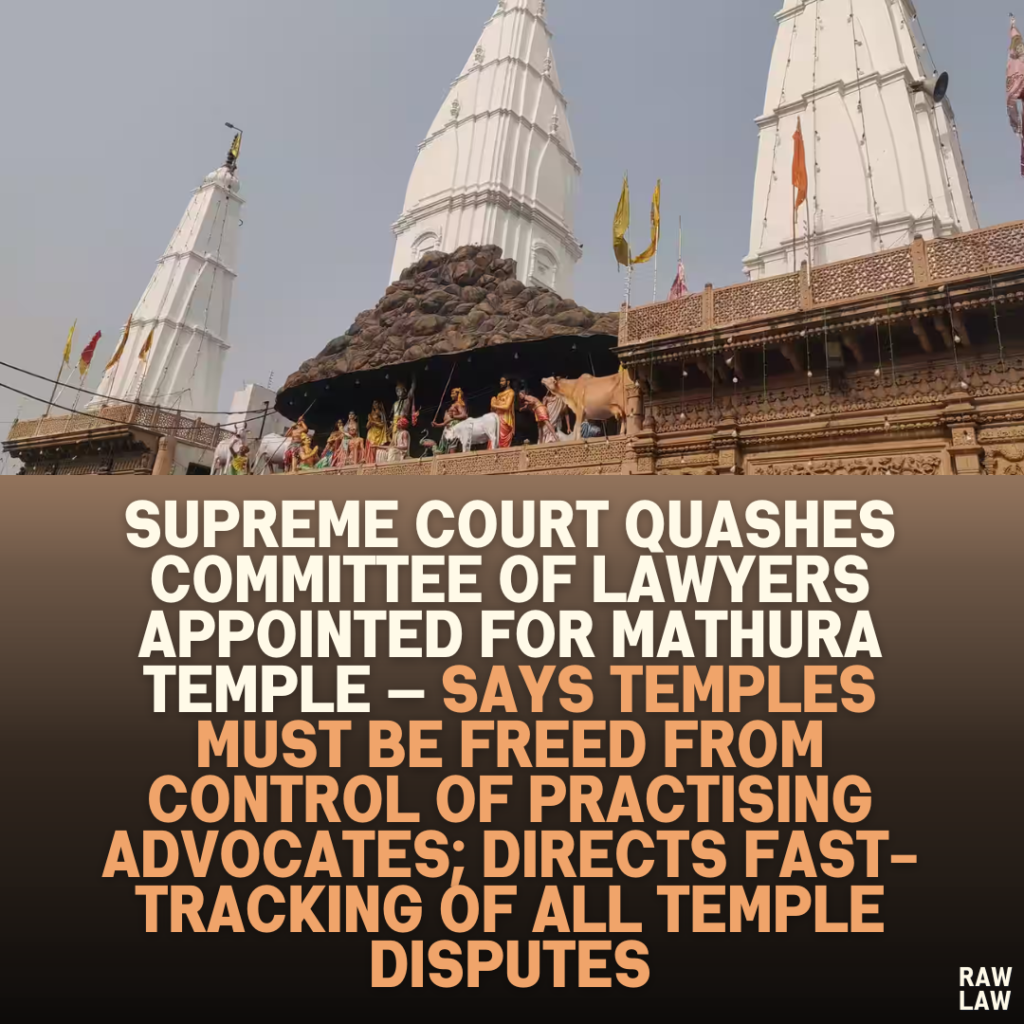Court’s Decision
The Supreme Court set aside the High Court’s order dated 27.08.2024 which had directed that a Seven Member Committee, including advocates, could not be appointed as Receiver for the Sri Giriraj Temple in Govardhan, Mathura. The Court, however, took note of the broader malaise afflicting temple administration in Mathura, expressed grave concern over the pervasive appointment of practicing advocates as Receivers, and directed that:
“Now, time has come when all these temples should be freed from the clutches of practising advocates of Mathura Court.”
The Court emphasized that all efforts must be made to dispose of temple-related civil disputes at the earliest and urged that future receivers, if necessary, should have religious leaning and knowledge of scriptures.
Facts
- Sri Giriraj Sewak Samiti, a registered society since 1957, manages the affairs of the Giriraj Temple in Mathura.
- Disputes arose after conflicting elections held in 1999, resulting in civil litigation (Original Suit No. 332 of 1999) and subsequent petitions.
- In 2021, the Trial Court appointed an advocate as Receiver, which was set aside by the High Court in 2021.
- On remand, the Trial Court in 2023 appointed a Seven Member Committee including three lawyers.
- A contempt application was filed alleging disobedience of the High Court’s earlier directive.
- The High Court held the appointment of a committee as contrary to Order XL Rule 1 of the CPC and directed a fresh consideration.
Issues
- Whether the appointment of a Seven Member Committee (including advocates) as Receiver was valid under Order XL Rule 1 CPC.
- Whether practicing advocates should be barred from being appointed as Receivers for temple management.
- Whether the High Court exceeded its contempt jurisdiction by directing reconsideration of the appointment order.
- Whether temple administration in Mathura is being misused for prolonging litigation and vested interests.
Petitioner’s Arguments
- There is no bar under Order XL CPC on appointing advocates as Receivers; their legal acumen is valuable in managing temple affairs.
- The High Court’s order arbitrarily excludes advocates, violating Article 14 of the Constitution by creating an unreasonable classification.
- The allegation that advocates prolong litigation is baseless and unsubstantiated.
- The appointment of a Seven Member Committee followed due process, including a hearing of parties.
- The contempt jurisdiction was misused to indirectly challenge an administrative decision rather than address wilful disobedience.
Respondent’s Arguments
- The Appellant lacks locus standi, as their appointment as committee member had already been set aside.
- The High Court correctly held that the appointment of a committee instead of a single receiver violated its prior order.
- Advocates have shown vested interest in prolonging litigation to maintain control over temple management.
- A person well-versed in the temple’s customs and scriptures must be appointed to safeguard the temple’s sanctity and administrative needs.
- Existing receiverships have deprived sewayat families of livelihood and devotees of facilities.
Analysis of the Law
- The Supreme Court examined Order XL Rule 1 CPC and clarified that the power to appoint receivers is discretionary and must serve the ends of justice.
- Appointment of Receivers should preserve the property and not result in administrative stagnation or litigation prolongation.
- The Court also discussed Section 94 of the CPC, which empowers courts to take interim measures including the appointment of receivers to avoid defeat of justice.
Precedent Analysis
The Court cited:
- Satyanarayan Banerji v. Kalyani Prosad Singh Deo Bahadur (AIR 1945 Cal 387): Receiver is a representative of the Court.
- T. Krishnaswamy Chetty v. C. Thangavelu Chettiar (AIR 1955 Mad 430): Laid out five principles for receiver appointments, emphasizing judicial discretion and urgency.
Court’s Reasoning
- The litigation over the Sri Giriraj Temple has been pending for 25 years, with no substantial progress.
- Receivers, particularly advocates, have a vested interest in keeping litigation pending.
- Appointment of a Seven Member Committee frustrates the purpose of Order XL CPC.
- Courts cannot indefinitely manage temple properties through Receivers without deciding the underlying disputes.
- The condition of 197 temples in Mathura, many managed by Receivers, reflects systemic abuse of the judicial process.
“Receivership in the temple town of Mathura has become the new norm… The interest of Receiver lies in keeping the litigation pending… Practising lawyer cannot devote sufficient time…”
Conclusion
The Supreme Court did not merely confine itself to the dispute about one temple but addressed the widespread problem of prolonged litigation and unchecked receiverships in Mathura. The Court:
- Directed the District Judge, Mathura, to expedite all temple-related civil cases.
- Requested temple management be kept away from advocates and administrative officers.
- Noted that the judiciary must not be used to serve vested interests.
Implications
- The decision is likely to overhaul how temple disputes are handled in Mathura.
- Sets precedent discouraging appointment of advocates as Receivers in religious institutions.
- Signals strong judicial disapproval of litigation abuse and administrative inertia in temple management.
- Encourages religiously inclined and scripturally knowledgeable individuals for management roles.
- May lead to faster resolution of hundreds of pending temple-related suits in Mathura.



